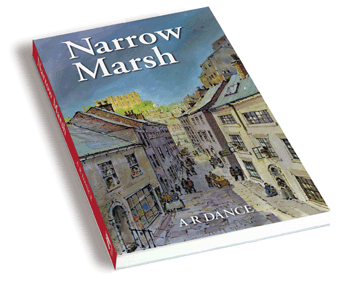Narrow Marsh

Price: £7.99
Historical background
The early 19th century was an era of dramatic social change in Britain, of enormous wealth for some and grinding poverty for others. Nottingham was a rapidly expanding town. The growth of its traditional hosiery industry had attracted many people from the surrounding rural areas, lured by the prospects of regular work. But the demands for extra accommodation resulted in grim back-to-back houses, where families were crammed tightly together in overcrowded tenements around narrow courts and alleys. And the grimmest of these areas was Narrow Marsh. Many of these tenements were home to the many framework knitters, who toiled long hours in their attic workrooms. But by 1811 Nottingham was a town of fear and famine. As the Napoleonic Wars drew to an end there was a slump in demand for hosiery. Many of the framework knitters found themselves facing unemployment, poverty and starvation as their employers sought to defend their profits by cutting wages and introducing changes to the traditional methods of working. Whole families were rendered destitute. And this was an era where state aid was virtually non-existent.
The book
It is against this grim background that Narrow Marsh is set. The story follows the adventures of William Daniels, the son of a poor framework knitter. Whilst the characters are largely fictitious, the novel is set against real events of the time, such as the rise of the Luddites, the Pentrich Revolution and the reality of life in the worst of Nottingham’s slums. Narrow Marsh is intended to convey, as accurately as possible, the spirit of 200 years ago, when change was often viewed more with foreboding than optimism by many who saw their future imperilled by decisions over which they had little or no say. And yet it is indomitably about the spirit of human resilience and hope. And that is always with us, wherever we may choose to look.
The plot
With low wages and long working hours, desperate men turn to direct action
and machine breaking. And when a raid goes wrong and a man dies, someone has
to pay the ultimate price. James Daniels, a friend of the condemned man, takes
his son William to the public execution and from that day onwards young William
develops a burning desire for justice and freedom. But when William befriends
the headstrong daughter of a wealthy factory owner, little does he realise
the dangers that lie ahead and the extent to which their contrasting backgrounds
will affect himself, his family and
their own futures.
Reviews
‘One of the best novels I have read. The story just flew through my fingers and I couldn’t turn the pages fast enough.’
(East Midlands Arts)
‘A highly evocative story of early 19th century high and low life. At its heart, one of England’s most notorious slums. Unputdownable.’
(John Brunton, journalist and author).
'The sense of overriding hope against unrest and misfortune will stay
with you long after you finish this rewarding novel.'
(Nottinghamshire
Today)